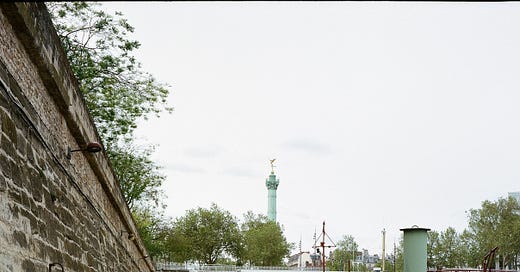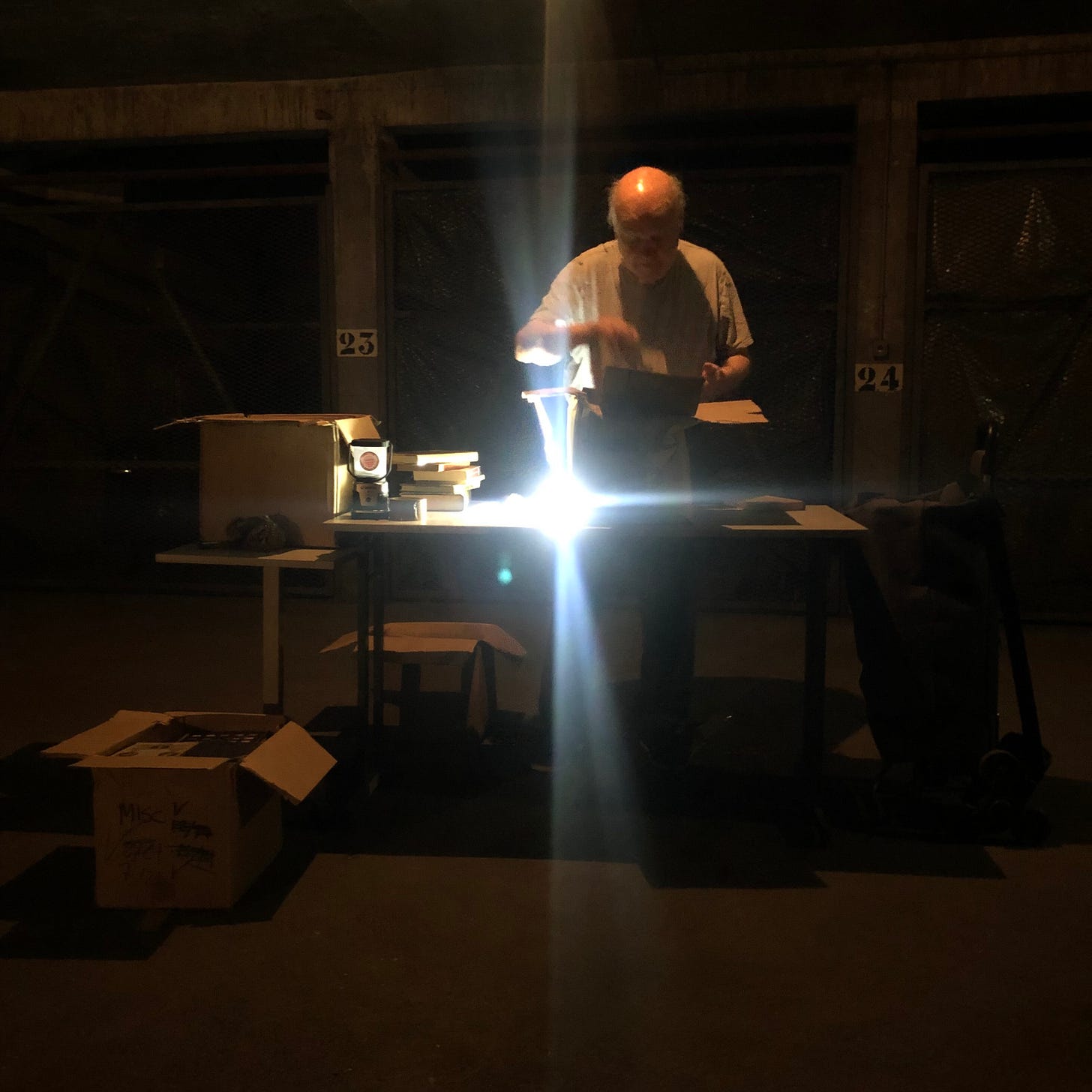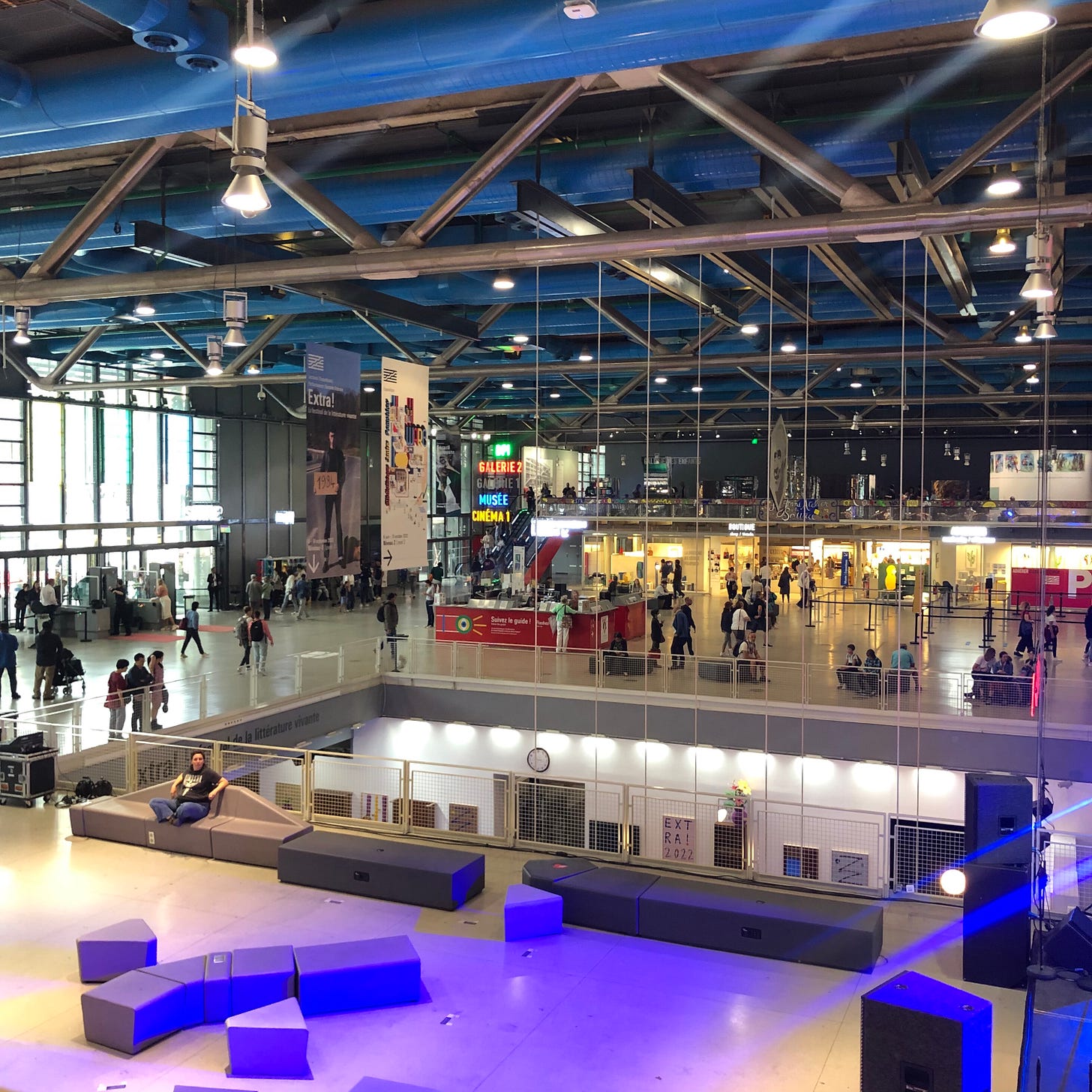5pm
For the intent and purpose of this story, this day in the life begins on a Tuesday at 5pm. Our protagonist is me, who on this particular day is an online lecturer for a travel company that specializes in intellectual history. Twenty people have signed up for my one-hour lecture, “A (brief) History of Montmartre.” Thanks to the glories of the Internet, I can teach from the comfort of my apartment, which is on the top floor of a building that sits above a tattoo parlor and a kebab restaurant.
The scent of slow-cooked lamb and oily French fries wafts up into my home. I forgot to close the windows for fear of the summer heat, but the lecture has begun, and it’s too late now to go off-camera. Within minutes, the smell of the hot meat and the concrete heat from outside latches onto my entire body. I reach for a sweat rag. I am sweating profusely. I make a joke about wiping down my face onscreen.
For this lecture, I decide to begin the history of Montmartre with the Franco-Prussian War. One of the slides says “The Prussians Are Coming!”, a reference to my favorite story by Orson Welles. I talk about the history of the Prussians’ siege of Paris and its connection to the most important French revolution you’ve never heard of, the Paris Commune. My favorite part of the lecture is when I get to the Jazz Age of the 1920s, when I tell the story of the most important American you've never heard of, Eugene Bullard, a war hero, jazz man, and staple of the Lost Generation community who died unknown to history as an elevator operator in New York. Towards the end of my lecture, I read an excerpt from Molly Bloom’s soliloquy in James Joyce's Ulysses:
6:30pm
After my lecture, my brain needs a break, which is why I turn on my Playstation-4 and parachute onto a fictional medieval island in the Adriatic sea. The island is called Fortune’s Keep. A gas cloud is encroaching upon the medieval landscape, and me and my teammate—a real life person who lives in Holland and speaks to me over the headset—have a simple mission: loot treasure boxes for modern weaponry so we can defend ourselves and/or kill the other forty-eight avatars controlled by humans beings hoping to become the temporary masters of Fortune’s Keep.
7:30pm
We lose quickly in a maelstrom of gratuitous violence. I put on my basketball shoes and walk across the Bastille and down the Rue des Rosiers for the first session of a Tuesday night basketball league that takes place in a community art center that also functions as a gym. I meet old friends who I haven’t seen in two years and run back and forth between the two baskets for 1.5 hours, sweating out toxins while trying to toss an orange ball into one of the baskets. My team wins and loses. I walk home alone bathed in the orange gloom of the street lamps, which reflects oh-so-beautifully on the Marais’ grey cobblestoned streets.
9:30pm
Back at home, I take a shower and eat hard cheese and soft bread and fig-infused tapenade and homemade guacamole with my wife and our friend. We talk about the anxiety that other human beings can exude upon us, and we also talk about still feeling hungover from Monday night’s spoken word conversations. I play piano for a few minutes, focusing on a melody that’s been stuck in my head over a chord progression in A-flat. After our friend leaves, my wife and I catch up on the day, watch an episode of The Wire, and go to bed.
8:45am
I wake up feeling motivated to write and finish a Substack post that’s been irking me for the past week. For the last seven days, l've been poring through my old notebooks, trying to find material to write the next chapter of my Parisian novella about a young writer trying to figure out who he is. The problem is, these days, I am quite confident in who I am, which means I’m estranged from the idea of revisiting a time in my life when I was so damn confused all the time.
I edit the chapter over coffee and feel that it’s almost ready, but as soon as I leave home, the narrative floats out of my head, which is almost always a good sign that the chapter is either worthless, or it isn’t finished yet. During the metro ride to my day’s next destination, I stress out about not having posted something on Substack for my paid subscribers. I think: you’re one of the mains reasons why I’ve been so inspired to write these past months. I feel like I owe it to you to write something interesting. But nothing comes, and I thus find myself in the familiar position of imposter syndrome, a writerly truism that’s as boring as it is a constant. I decide I will instead focus instead on whatever comes to mind, which happens to be this very story.
10:32am
I resign myself to accepting that not every day is a good day, and that not every chapter—let alone story—is worth telling. Sometimes life consists of zeros, and that’s okay. Sometimes life is taking naps and watching movies and playing video games all day. This is the story of not noticing a single interesting person or thing on the metro. We can’t be expected to be interesting—or interested—all of the time.
11:04am
I exit the metro and think, daily life isn’t a story, it’s only the setting. Daily life is latency. The 25-minute metro ride takes me up to the backside of Montmartre, where, every week for the better part of five years, l've been coming to help my friend and mentor, the prolific author John Baxter, to look for signed 1st-editions in a gloomy garage one-hundred feet below the cobblestones of Paris (John’s writing is an inspiration, and he’s on Substack, too):
This still isn’t a proper narrative, at least not yet, but the descent into the garages does provide a setting, which reminds me of what good writing is really all about—paying attention. I set up our workspace, a fold-out table where we can more easily search for first editions in dozens of cardboard boxes. It looks like this:
With the characters established, I decide that this story only now needs some intrigue.
Most of western literature is based on the masculosexual idea that every story requires a climax.1 So maybe the day’s zenith is finding a signed 1st-edition of Joan Didion’s The White Album, or maybe the plot revolves around what happens after we run into the Serbian super who emerges from a lower-level garage.
His wife is the concierge, and I have never seen her smile, but the super is always jolly and his smile is genuine, and today his deep laugh reverberates throughout the depths of the cold, concrete walls. He asks us about the books we’ve found, and for how much we’re selling. I tell him 10,000 Euros for the lot of them. He laughs. “If I had 10,000 Euros to spend, I wouldn’t be down here in these garages.” I corral him in for a side-hug. “Neither would we.” I consider him a friend even though I don’t know his name.
12pm
Another possibility for turning my day into some kind of interesting narrative: the action could take place at the Café de La Poste, a familial restaurant on the corner of Rue Daumremont and Rue Marcadet, where a lithe, taciturn man is always standing at the bar, drinking creamy chardonnay while his jumpy white dog snivels at his feet. The head-chef has rosy cheeks and reminds me of Chef Boyardee. My favorite server is the fortysomething woman with a punk-rock style and jet-black hair. This isn’t a story, either, but it is a beginning. Daily life is full of snapshots, impressions and vignettes, but during lunch I remember that not everything has to be reduced to narrative. There are so many stories that aren’t mine to tell, that were never meant to be written. In the company of good friends, it’s easy to lean into the fleeting beauty of the contemporary.
1:25pm
After a leisurely lunch, which in Paris can be its own kind of narrative (ours begins with two glasses of red wine, followed by a disappointing Croque Monsieur but a consistently-excellent rump steak with pepper sauce, a side salad, and creamy mashed potatoes, capped off with two noisettes (espresso with a dash of cream)—I take the metro to the Centre Pompidou and write down the words you are reading now.
4:56pm
This is the final paragraph, which according to the rules of writing means it is the conclusion. Yesterday, my day started at 5pm, and it is 4:59pm now. Hegel said something along the lines of “thought can only grasp the present order when it begins to disintegrate.” The day is ending, and so my understanding of it has come to fruition. But still, I protest: what if this day in question started differently, with the alarm clock, or with a familiar stranger’s smile, or with the first glass of wine at the end of a long day, or with the moment I sat down to write these letters?
Life isn’t the story, it’s just the setting. It’s up to each of us to come up with our own narrative. That’s one answer, at least. But I prefer the question: what might a day’s narrative look like to you?
Jane Allison’s Meander, Spiral, Explode is a revelation, and also the best book on writing craft I’ve ever read.









I like the photo you took of me poring (not "pouring") over books. It makes me look like something between a priest at his devotions and an alchemist creating unholy substances - which is probably not far from the truth. As you say, the textures of our days wax and wane. "Some days are diamonds, some days are stone...." Keep up the good work.
“during lunch I remember that not everything has to be reduced to narrative” - what a sobering reminder (and what an excuse to just chill out and enjoy the view! phew, finally!)